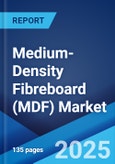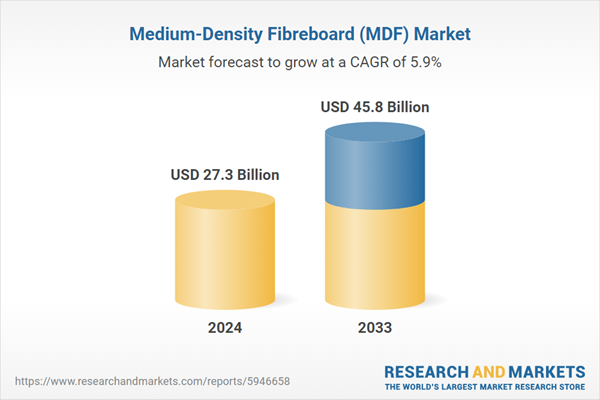Medium-density fibreboard (MDF) is an engineered wood product that is composed of wood fibers, wax, and resin compressed under high pressure and heat to create a dense, sturdy board. It is known for its versatility and offers uniform density and smooth surface, which makes it an ideal choice for cabinetry, furniture, shelving, and interior molding. It has a homogeneous composition that allows for precise cutting and machining, while its consistent surface provides an enhanced canvas for finishes like paint or veneer. As it is environmentally friendly, the demand for MDF is increasing across the globe.
At present, the rising adoption of MDF, as it is cost-effective and easy to customize, is contributing to the growth of the market. In line with this, the increasing employment of MDF, as it maximizes the use of wood fibers from sustainable sources and minimizes waste, is strengthening the growth of the market. Moreover, the growing demand for durable and affordable wood products among the masses around the world is positively influencing the market. In addition, the rising number of environmentally conscious consumers is providing lucrative growth opportunities to industry investors. Furthermore, the increasing demand for sleek and modern aesthetic products among individuals is supporting the growth of the market. Besides this, the introduction of new MDF products with improved properties, such as fire resistance and moisture resistance, is bolstering the growth of the market.
Medium-Density Fibreboard (MDF) Market Trends/Drivers
Rising number of construction activities
The rising number of infrastructure and construction activities across the globe is bolstering the growth of the market. In addition, there is an increase in the demand for housing, commercial spaces, and infrastructure among the masses. MDF plays a crucial role in fulfilling these requirements as it offers versatility and affordability. Moreover, it is widely utilized for interior applications, such as doors, cabinets, and wall panels, in both residential and commercial buildings. The rising popularity of MDF due to its consistent quality and easy workability is propelling the growth of the market. Builders and contractors are widely adopting this engineered wood as it can be easily cut, shaped, and installed precisely. Additionally, it provides a smooth and reliable surface for finishes and coatings.Increasing demand for affordable and customizable furniture
There is an increase in the demand for affordable furniture among individuals to enhance the look of spaces. In line with this, the rising preference for customizable furniture solutions due to the inflating income level of individuals is bolstering the growth of the market. Apart from this, MDF is an easy-to-use product, which makes it a convenient material for furniture manufacturers. In addition, MDF allows for intricate designs and can be easily shaped into various furniture components. It has a smooth surface and consistent density that makes it ideal for painting, veneering, or laminating and allows for a wide range of design possibilities. Additionally, MDF is available in various thicknesses and sizes, which makes it suitable for both mass production and bespoke furniture.Growing popularity of laminated flooring in residential settings
The rising popularity of MDF-based laminate flooring among individuals in residential settings is bolstering the growth of the market. MDF serves as the core material for laminate flooring due to its enhanced stability and uniform density. In addition, it provides improved structural integrity to the flooring and ensures that it can withstand daily wear and tear effectively. MDF-based laminate flooring offers a cost-effective alternative to traditional hardwood flooring. It provides the aesthetic appeal of wood without the high price tag, which makes it an attractive option for budget-conscious consumers. Furthermore, it has a smooth and consistent surface and is ideal for the decorative laminate layer, which looks similar to various wood species, stone, or tile. This versatility allows homeowners and designers to achieve a wide range of design aesthetics while benefiting from the durability of laminate.Medium-Density Fibreboard (MDF) Industry Segmentation
This report provides an analysis of the key trends in each segment of the global medium-density fibreboard (MDF) market report, along with forecasts at the global and regional levels for 2025-2033. The report has categorized the market based on residential and commercial applications and new construction and replacement applications.Breakup by Residential and Commercial Applications
- Residential
- Commercial
The report has provided a detailed breakup and analysis of the market based on the residential and commercial applications. This includes residential and commercial. According to the report, residential represented the largest segment. In residential construction and interior design, MDF is used due to its versatility, cost-effectiveness, and aesthetic appeal. It is employed for cabinetry, furniture, flooring, wall paneling, and doors. In addition, it is commonly used for kitchen and bathroom cabinets due to its smooth surface and to provide desired aesthetics. It can be precisely shaped, which makes it an ideal choice for both mass-produced and customized furniture. On the other hand, MDF is utilized for decorative wall panels, wainscoting, and molding, enhancing interior aesthetics.
Breakup by New Construction and Replacement Applications
- New Construction
- Replacement
The report has provided a detailed breakup and analysis of the market based on the new construction and replacement applications. This includes new construction and replacement. According to the report, new construction represented the largest segment. New construction applications comprise the use of MDF in projects where entirely new structures or spaces are being built. In new infrastructure construction, it is used to construct projects, such as public buildings, schools, and healthcare facilities. It contributes to interior elements that enhance the functionality and visual appeal of these spaces. Apart from this, new construction is utilized in constructing interior spaces within commercial buildings, such as offices, retail outlets, and hospitality venues, and in residential spaces, such as cabinets, doors, flooring, and decorative elements.
Breakup by Region
- Asia Pacific
- Europe
- North America
- Latin America
- Middle East and Africa
The market research report has also provided a comprehensive analysis of all the major regional markets, which include Asia Pacific, Europe, North America, Latin America, and the Middle East and Africa. According to the report, Asia Pacific accounted for the largest market share.
Asia Pacific held the biggest market share due to the increasing number of residential and commercial construction projects. Apart from this, the rising consumer preference for MDF for interior applications is contributing to the growth of the market in the region. In line with this, the presence of well-established and technologically advanced manufacturing facilities is propelling the growth of the market. Besides this, the rising environmental concern is bolstering the growth of the market in the Asia Pacific region.
Competitive Landscape
Key players in the market are continuously investing in research and development (R&D) activities to create innovative products. This includes developing specialized MDF variants with enhanced properties and improved durability. Besides this, they are adopting sustainable practices in MDF production, such as sourcing wood fibers from certified sustainable forests to minimize waste and implementing energy-efficient manufacturing processes. These initiatives align with global environmental concerns and resonate with environmentally conscious consumers and builders. In line with this, companies are establishing production facilities in strategic regions to cater to local demand more efficiently and reduce transportation costs. Moreover, they are diversifying their product portfolios to offer a wide range of MDF products, including various thicknesses, sizes, and surface finishes.The report has provided a comprehensive analysis of the competitive landscape in the market. Detailed profiles of all major companies have also been provided. Some of the key players in the market include:
- Dynea AS
- M. Kaindl OG / Kaindl Flooring GmbH
- Sonae Arauco
- Duratex
Key Questions Answered in This Report
1. What was the global medium-density fibreboard market size in 2024?2. What will be the global medium-density fibreboard market outlook during the forecast period (2025-2033)?
3. What are the global medium-density fibreboard market drivers?
4. What are the major trends in the global medium-density fibreboard market?
5. What is the impact of COVID-19 on the global medium-density fibreboard market?
6. What is the global medium-density fibreboard market breakup by application?
7. What is the global medium-density fibreboard market breakup by construction?
8. What are the major regions in the global medium-density fibreboard market?
market?
Table of Contents
Companies Mentioned
- Dynea AS
- M. Kaindl OG / Kaindl Flooring GmbH
- Sonae Arauco
- Duratex
Table Information
| Report Attribute | Details |
|---|---|
| No. of Pages | 135 |
| Published | February 2025 |
| Forecast Period | 2024 - 2033 |
| Estimated Market Value ( USD | $ 27.3 Billion |
| Forecasted Market Value ( USD | $ 45.8 Billion |
| Compound Annual Growth Rate | 5.9% |
| Regions Covered | Global |
| No. of Companies Mentioned | 4 |









